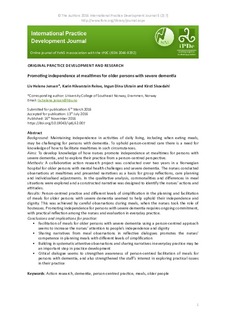| dc.contributor.author | Jensen, Liv Helene | |
| dc.contributor.author | Rekve, Karin Håvarstein | |
| dc.contributor.author | Ulstein, Ingun | |
| dc.contributor.author | Skovdahl, Kirsti | |
| dc.date.accessioned | 2017-12-08T11:57:37Z | |
| dc.date.available | 2017-12-08T11:57:37Z | |
| dc.date.created | 2017-01-19T14:38:21Z | |
| dc.date.issued | 2016 | |
| dc.identifier.citation | International Practice Development Journal, 6 (2),. | nb_NO |
| dc.identifier.issn | 2046-9292 | |
| dc.identifier.uri | http://hdl.handle.net/11250/2469770 | |
| dc.description.abstract | Maintaining independence in activities of daily living, including when eating meals, may be challenging for persons with dementia. To uphold person-centred care there is a need for knowledge of how to facilitate mealtimes in such circumstances. Aims: To develop knowledge of how nurses promote independence at mealtimes for persons with severe dementia, and to explore their practice from a person-centred perspective. Methods: A collaborative action research project was conducted over two years in a Norwegian hospital for older persons with mental health challenges and severe dementia. The nurses conducted observations at mealtimes and presented narratives as a basis for group reflections, care planning and individualised adjustments. In the qualitative analysis, commonalities and differences in meal situations were explored and a constructed narrative was designed to identify the nurses’ actions and attitudes. Results: Person-centred practice and different levels of simplification in the planning and facilitation of meals for older persons with severe dementia seemed to help uphold their independence and dignity. This was achieved by careful observations during meals, when the nurses took the role of hostesses. Promoting independence for persons with severe dementia requires ongoing commitment, with practical reflection among the nurses and evaluation in everyday practice. Conclusions and implications for practice: • Facilitation of meals for older persons with severe dementia using a person-centred approach seems to increase the nurses’ attention to people’s independence and dignity • Sharing narratives from meal observations in reflective dialogues promotes the nurses’ competence in planning meals with different levels of simplification • Building in systematic attentive observations and sharing narratives in everyday practice may be an important step in practice development • Critical dialogue seems to strengthen awareness of person-centred facilitation of meals for persons with dementia, and also strengthened the staff’s interest in exploring practical issues in their practice | nb_NO |
| dc.language.iso | eng | nb_NO |
| dc.rights | Navngivelse-Ikkekommersiell 4.0 Internasjonal | * |
| dc.rights.uri | http://creativecommons.org/licenses/by-nc/4.0/deed.no | * |
| dc.title | Promoting independence at mealtimes for older persons with severe dementia | nb_NO |
| dc.type | Journal article | nb_NO |
| dc.type | Peer reviewed | nb_NO |
| dc.description.version | publishedVersion | nb_NO |
| dc.rights.holder | 2016 The Authors | nb_NO |
| dc.source.volume | 6 | nb_NO |
| dc.source.journal | International Practice Development Journal | nb_NO |
| dc.source.issue | 2 | nb_NO |
| dc.identifier.doi | 10.19043/ipdj.62.007 | |
| dc.identifier.cristin | 1432461 | |
| cristin.unitcode | 222,56,1,0 | |
| cristin.unitname | Institutt for sykepleie- og helsevitenskap | |
| cristin.ispublished | true | |
| cristin.fulltext | original | |
| cristin.qualitycode | 1 | |

